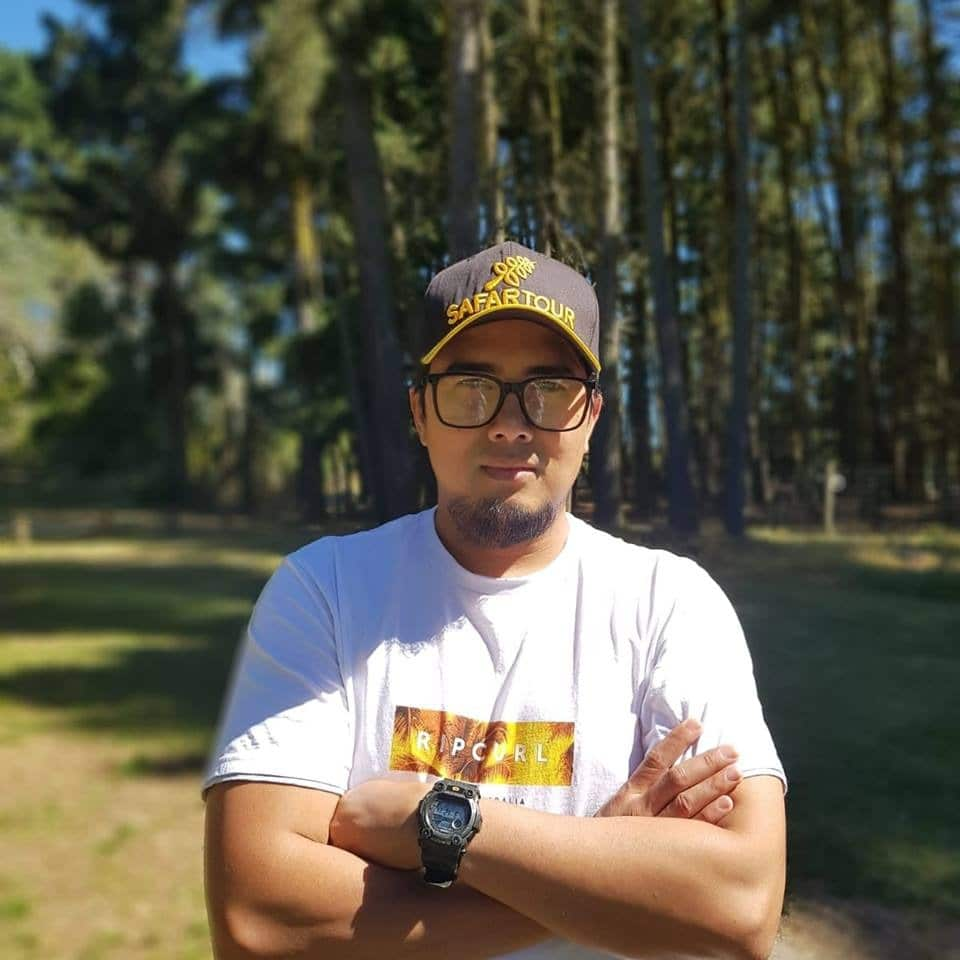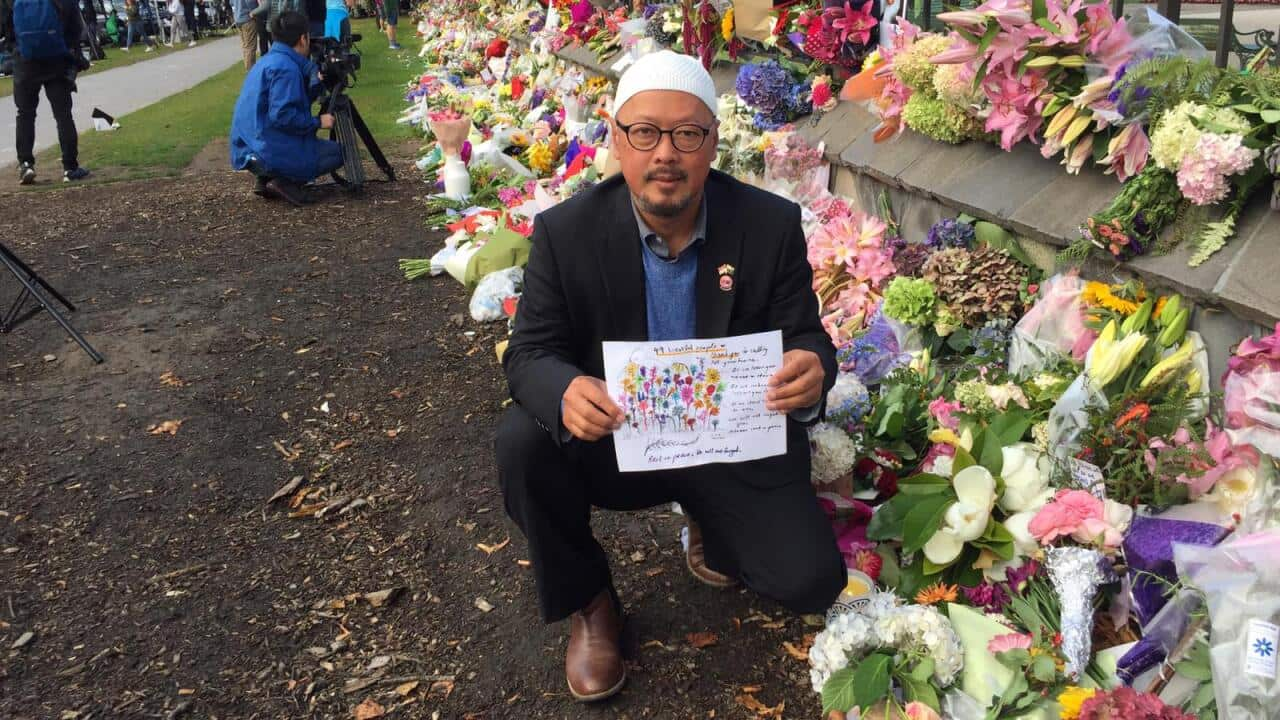Muslims throughout the world are currently observing the holy month of Ramadan, a religious fasting period believed to be a month full of blessing.
Activity increases at mosques during the month, as salat prayers and fast-breaking iftar meals are more often held in mosques. Despite the horrific events of this year's shooting at mosques in Christchurch, that also includes in mosques in New Zealand.
Agam Jaya Syam, the Trustees Chairman of the Al-Ameen Mosque in Wellington tells SBS Indonesian that this year's Ramadan is very different to years' past.
"The most significant thing is the number of community leaders who want to come to break the fast together," Mr Syam says, noting that church leaders and members of parliament are some of those who have attended outside of the Muslim community. Two months have passed since the March 15 shootings in Al Noor Mosque and Linwood Islamic Center in Christchurch. While feelings are still raw, a spirit of solidarity among New Zealanders has not waned.
Two months have passed since the March 15 shootings in Al Noor Mosque and Linwood Islamic Center in Christchurch. While feelings are still raw, a spirit of solidarity among New Zealanders has not waned.

Members of the Muslim community enjoy the Iftar, the evening meal, at Al Noor Mosque on May 11, 2019 in Christchurch, New Zealand. Source: Kai Schwoerer/Getty Images
Ibnu Sitompul is a PhD student at the University of Canterbury in Christchurch. When the shooting at the Al Noor Mosque happened, he had just parked his car and was walking toward the mosque when he realised something was wrong.
"It was less than a minute until I'd have been entering the mosque's parking area," he says. He ran from the mosque when he saw panicked people running from its exits.
Asked how this year's Ramadan differs at Al Noor Mosque in the wake of the shooting, Ibnu says that the number of people coming to Taraweeh prayers and also Friday prayers has almost doubled.
Ibnu says he thinks fear is no longer felt by many Muslims in New Zealand.
"They show their support instead, so they come to the mosque," he says. Safeguards around New Zealand's mosques remain in effect, and Ibnu says that at Al Noor, in addition to two police officers, every Friday prayer sees the mosque guarded by several local residents.
Safeguards around New Zealand's mosques remain in effect, and Ibnu says that at Al Noor, in addition to two police officers, every Friday prayer sees the mosque guarded by several local residents.

In this Saturday, March 23, 2019 file photo, Worshippers prepare to enter the Al Noor mosque following last week's mass shooting in Christchurch, New Zealand. Source: AAP Image/AP Photo/Mark Baker
"There are five or six residents... the neighbours who live around the mosque or those who come from elsewhere, the non-Muslims who come to look after the people doing the salat," he says.
Agam Jaya Syam tells the same story for Wellington. He says that in front of Wellington's Al-Ameen Mosque there are also police cars standing by during iftar and taraweeh hours. Dr Nelly Martin Anatias, a Muslim and lecturer at the Auckland University of Technology's School of Language and Culture, tells SBS Indonesian that all Auckland's mosques are guarded by police, 24 hours a day, seven days a week.
Dr Nelly Martin Anatias, a Muslim and lecturer at the Auckland University of Technology's School of Language and Culture, tells SBS Indonesian that all Auckland's mosques are guarded by police, 24 hours a day, seven days a week.

Police officers stand guard outside the Linwood mosque during Friday prayers in Christchurch on May 3, 2019, ahead of the holy month of Ramadan. Source: SANKA VIDANAGAMA/AFP/Getty Images
She says that residents were surprised by the security measures because they feel New Zealand is still a safe country, but understand the precautions and desire to protect the local Muslim community all the same.
"We feel that the New Zealand government and the people around us are very kind and very protective so there is no feeling of anxiety anymore when we go to the mosque to worship," says Dr Anatias.
"We stay vigilant, but we don't feel threatened like last month."
For Irfan Yunianto, a shooting survivor and PhD student at the University of Otago, Ramadan after the tragedy is not that different from the previous year.
"Perhaps the slightest difference is that there are some worshippers who now have to use the wheelchair or walking stick to get to the mosque due to gunshot wounds," he tells SBS Indonesian. "Of course there is still a sense of loss towards brothers or friends who used to go to the mosque together, but now they are gone."
Irfan was inside the Al Noor mosque when the shooting took place. The incident had a deep impact on him and he no longer wants to discuss the shooting's details, as the last time he did it was when he made the police statement.
Hoping to move on from the event and memory thereof, Irfan attends victim support's meetings, which also provide crucial psychological support.
"I just had a meeting with victim support yesterday afternoon," he says.
"Some worshipers have said the anxiety and trauma they've experienced have been disrupting their daily activities," Irfan continues. "Those who are severely traumatised, other than those who have lost family members or relatives, are also those who had direct contact with the shooter." Fifty-one people died in the March shootings. One of the deceased is Lilik Abdul Hamid, an Indonesian engineer who had worked for Air New Zealand for the past 16 years.
Fifty-one people died in the March shootings. One of the deceased is Lilik Abdul Hamid, an Indonesian engineer who had worked for Air New Zealand for the past 16 years.

Irfan Yunianto was inside the Al Noor mosque in Christchurch when the shooting happened. Source: Facebook: Irfan Yunianto
Ibnu Sitompul, who has lived in Christchurch since 2016, also knows Lilik's family and says the relationship between the Indonesian Muslim community in Christchurch was 'increasingly close' after the tragedy of the Christchurch shooting.
"In the past, there was one or two occasions where we [Ibnu and Lilik's family] did a recitation or iftar together. But now, it's already the fifth time," Ibnu says. "We still often talk about the shooting and remember the deceased."
"Also every Saturday and Sunday I go to the house of the deceased Mr. Lilik to accompany his family. More gatherings. So we feel even more united."

Ibnu Sitompul was less than a minute away from the Al Noor mosque's entrance when the shooting took place. Source: Supplied

